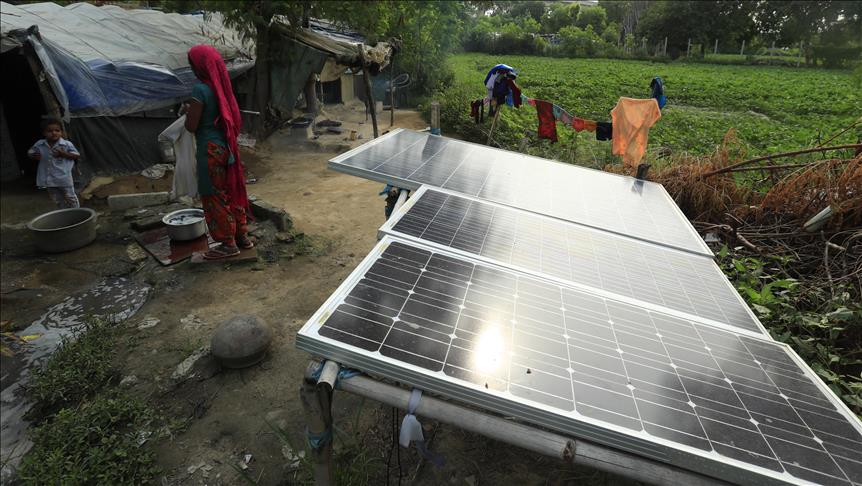

By Anadolu Agency
Annual investments in clean energy in emerging and developing countries, excluding China, will need to multiply by a factor of seven to meet growing energy needs and align with Paris Agreement goals, according to a new report from the International Energy Agency (IEA) and International Finance Corporation (IFC) on Wednesday.
The report, Scaling Up Private Finance for Clean Energy in Emerging and Developing Economies, shows that investments in these economies need to reach $1.9 trillion a year by the early 2030s, up from $262 billion last year.
Clean energy investments totaled $773 billion in these economies, with China alone accounting for $511 billion, followed by India and other Asian and Latin American countries.
However, the report showed that investments at this scale need to more than triple to the $2.8 trillion per year by the early 2030s to meet rising energy needs and create sustainable economic growth.
‘Clean energy investments increasing gradually is good news. The bad news is that more than 90% of the increase since August 2015 to date in clean energy comes from advanced economies and China. Only 10% of the rise comes from emerging and developing countries, which is a trend that needs to change,’ Fatih Birol, head of the IEA, said during a news conference for the launch of the report.
Clean energy investments in emerging and developing countries, excluding China, have been more or less flat for the past eight years.
According to the report, clean energy investments in these countries totaled $538 billion in 2015, with China accounting for $287 billion.
– 60% of finance required from private sources
Birol called for additional investment in sustainable energy, not only from governmental funds but also from private sources.
‘Today’s energy world is moving fast, but there is a major risk of many countries around the world being left behind. Investment is the key to ensuring they can benefit from the new global energy economy that is emerging rapidly,’ he said.
However, he said it is almost impossible to achieve the needed clean energy investments in these countries with public finance alone.
The report finds that today’s $135 billion in annual private financing for clean energy in these economies, outside China, will need to rise to as much as $1.1 trillion a year within the next decade.
‘About 60% of the finance for the emerging and developing countries for clean energy needs to come from private sources,’ Birol said, adding that the urgent scaling up of clean energy investments in emerging and developing countries offers many advantages and opportunities, from expanded energy access to job creation, improved energy security and a sustainable future for all.
Currently, about 775 million people in emerging and developing countries still lack access to electricity, and 2.4 billion people lack access to clean cooking fuels.
– Private capital needed at speed and scale
‘The battle against climate change will be won in emerging and developing economies where the potential for clean energy is strong but the level of investment is far below where it should be,’ IFC Managing Director Makhtar Diop said.
‘To address the pressing energy demands and emissions reduction goals in EMDEs (emerging market and developing economies), we need to mobilize private capital at speed and scale and urgently develop more investable projects.’
The report emphasizes the need for greater international technical, regulatory, and financial support to unlock the potential for clean energy in emerging and developing economies.
The IEA and IFC’s report has been launched ahead of the Global Financing Pact Summit that will take place in Paris between June 22 and 23.
According to the French government, the summit aims to ‘build a new contract with the North and the South.’ The Global South’s representation at the summit will be clearly visible, with several world leaders expected to attend, including, among others, Kenya’s President William Ruto, Brazilian President Luiz Inacio Lula da Silva, China’s Prime Minister Li Qiang and Barbados Prime Minister Mia Mottley.
Moreover, French President Emmanuel Macron and the German Chancellor, Olaf Scholz, are expected to attend, representing the two heads of state from the G7 countries.
US President Joe Biden and India’s Prime Minister Narendra Modi, who is expected to be in the US at the time of the summit, are likely to announce a North-South deal enabling General Electric fighter jet engines to be co-manufactured in India.
Among the summit’s top priorities will be the $100 billion finance commitment of developed economies to developing countries, private sector investment in a just and clean transition, and the needed reforms for increasing climate finance from multilateral development banks.
We use cookies on our website to give you a better experience, improve performance, and for analytics. For more information, please see our Cookie Policy By clicking “Accept” you agree to our use of cookies.
Read More